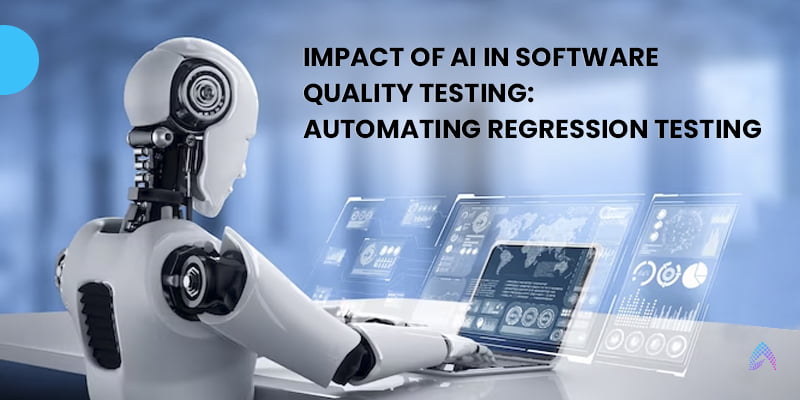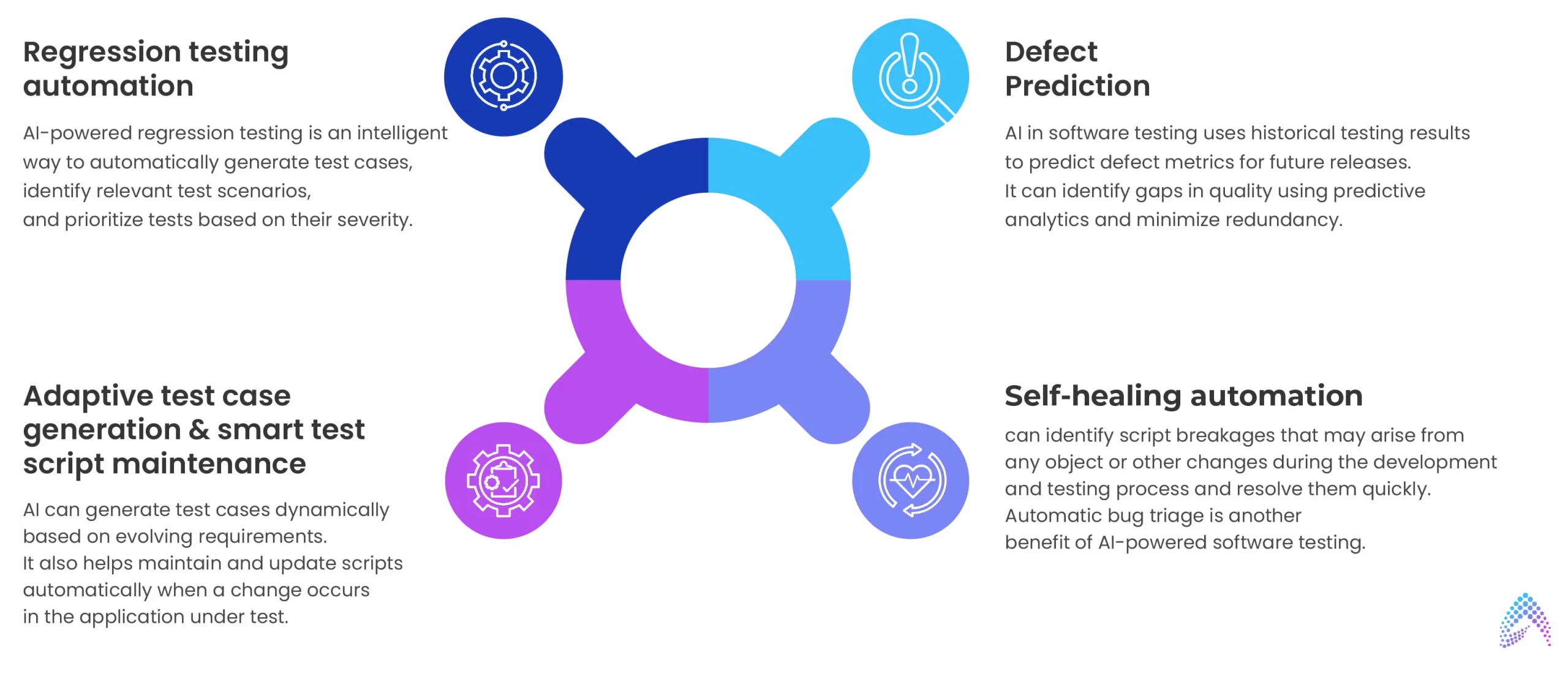Impact Of AI In Regression Testing: Power Of Automation in Software QA

AI in Regression Testing: Revolutionizing Software Quality Assurance
In the fast-paced world of software development, ensuring the reliability and functionality of applications is paramount. Regression testing, a critical component of the software testing lifecycle, ensures that new code changes do not adversely affect existing functionalities. Traditionally, this process has been manual, time-consuming, and prone to human error. However, the integration of AI in regression testing is transforming this landscape, offering enhanced efficiency, accuracy, and scalability.
It is estimated that over 60% of the test cases are redundant and prone to errors and a lot of it can be blamed on human errors that creep in while designing the test case scenarios. Manual testing also introduces risks associated with human errors and this challenge is even more prominent when applications are being developed and deployed across multiple platforms and devices. For example – creating comprehensive plans for identifying corner cases is difficult, and then finding them in manual testing becomes a hit-and-miss game.
A key requirement for addressing these issues has always been the need for dev & test teams to find better approaches for designing test cases as well as methods for manual testing.
So it’s a no-brainer that Artificial Intelligence (AI) could be the missing link to achieving even higher agility and rigor that ultimately delivers better software. AI in software testing helps you maximize defect detection and risk coverage while reducing costs, execution time, and the number of test cases.
But why exactly does test automation fail?
Test automation tools are considered to be the gold standard for software testing, and are a critical component of testing. However, there are some well-known hurdles with automation. These include, but are not limited to:
1. Deciding Which Tests to Automate:
It is one of the biggest challenges of automation testing. Many businesses and software testing teams fail to correctly identify automation tests, and conversely which ones should be tested manually. Here are some factors you need to consider while automating test cases.
- High-value and business-critical tests
- High-volume, repeatable, and tedious tests
- Stress and load tests
- Frequently used functionalities
If you are conducting tests on a stable entity that necessitates repetitive and continuous actions, automation testing is recommended. However, if you are dealing with a dynamic system that undergoes frequent changes, relying solely on automation may not be advisable.
2. Selecting The Right Tools:
Among many tools, selecting the right tool is always a challenge for QA teams. It’s not merely about choosing the most trending tool in the market. It’s to evaluate a tool’s features and functionalities before investing.
There are some factors to check before selecting a tool.
- How can we reduce the time and effort required to implement and maintain test scripts and suites?
- How can I create useful test reports and metrics?
- Check how automation test suites be designed and implemented correctly to keep up-to-date quickly with minimal maintenance effort.
3. High Maintenance of Traditional Script-based Tests:
With traditional automation, testers need to spend considerable time learning how to script each test scenario. Script-based tests need to be maintained and updated frequently whenever there is a new feature or product improvement introduced.
On the other hand, scripts become as vulnerable to defects as code is. This means that when we have defects in our test scripts, it causes false positives and script errors that create burdens for the QA teams.
4. Over-Emphasis on UI Testing:
Traditional test automation approaches focus more on UI testing, which involves interacting with the application’s Graphical User Interface. While UI testing is essential, it is often fragile and time-consuming. This overemphasis on UI testing can lead to the neglect of other crucial layers of testing, such as API or unit testing. By overlooking these layers, traditional test automation fails and may compromise the overall effectiveness and efficiency of the testing process.
The Evolution of Regression Testing
Regression testing involves re-executing previously conducted tests to confirm that recent code changes have not introduced new defects. As software applications grow in complexity and scale, the volume of test cases increases, making manual regression testing increasingly challenging. AI addresses these challenges by automating various aspects of the testing process, thereby accelerating test execution and reducing the likelihood of errors.
Role of AI in Software QA Testing and its Benefits:

1. Regression testing automation:
Regression testing is tedious, time, and resource-intensive process. Whenever there is a change in the code, the QA team has to check the application’s functionalities and confirm that the pre-existing features are still working as required. Though regular automation helps QA teams, it further lags in learning from test results and early detection of bugs with higher potential risks.
AI-powered regression testing is an intelligent way to automatically generate test cases, identify relevant test scenarios, and prioritise tests based on their severity. Together with ML, AI can continuously learn from test results and adapt test suites to focus on areas with a higher potential for risk. This results in faster test execution, enhanced test coverage, and early detection of software regressions. This further reduces manual effort and time while ensuring higher-quality software releases.
2. Defect Prediction:
In conventional testing methods, a few bugs and errors remain unnoticed for a long time and create roadblocks in the future.
Defect analysis is a continuous process of quality improvement and planning. One of the best applications of AI in software testing is its ability to predict defects before they occur and become vulnerable. AI in software testing uses historical testing results to predict defect metrics for future releases. This enables your QA manager to take corrective actions to ensure your project meets the necessary KPIs.
In conventional testing methods, a few bugs and errors remain unnoticed for a long time and create roadblocks in the future.
AI can help in:
- Identify gaps in quality using predictive analytics.
- Minimize redundancy using real-time or offline analysis of test cases.
- Improve the effectiveness and efficiency of your testing processes with actionable insights.
This enables teams to target their testing efforts more effectively and prevent potential issues from reaching end users.
3. Adaptive test case generation & smart test script maintenance:
AI can generate test cases dynamically based on evolving requirements and changes in the application to ensure comprehensive coverage and increased test effectiveness.
Also, AI-powered automation testing helps in maintaining and updating scripts automatically when a change occurs in the application under test. AI algorithms can learn from the changes and update the corresponding test scripts, ensuring less manual intervention and that they remain up to date.
4. Self-healing automation:
Self-healing automation is one of the best features and benefits of AI-based software testing – since AI and ML are the best learning and predictive models, they can identify script breakages that may arise from any object or other changes during the development and testing process and resolve them quickly.
Apart from identifying and analyzing, automatic bug triage is one of the best benefits of AI-powered software testing. Bug triage can automatically analyze a bug’s severity, impact, and relevance; and assign them to the respective stakeholders for resolution, streamlining the bug management process
Role of AI in Regression Testing:
Traditionally, regression testing involves re-executing a predefined set of test cases to ensure that software changes didn’t introduce new bugs or functional disruption. However, this approach can be time-consuming and resource-intensive. AI in regression testing is revolutionizing the testing approach by introducing intelligent automation and advanced analytics.
AI algorithms can analyze vast amounts of historical testing data to identify patterns and dependencies within the software system. This enables AI to generate intelligent test cases and prioritize them based on risk factors, ensuring optimal test coverage.
Furthermore, AI-powered tools can use machine learning techniques like anomaly detection and predictive analytics to identify patterns and potential areas of regression risk. This enables faster test execution and reduces the manual effort required for maintaining and updating test cases.
Overall, AI-powered regression testing benefits businesses in numerous ways, including increased speed and accuracy, reduced costs, and enhanced productivity.
Example:
UI is one of the crucial elements of every application, and its testing is challenging as the application design and functionalities undergo multiple changes during the development lifecycle. As customers seek high-performing and user-friendly applications, any lag in testing can impact the organization’s reputation.
AI can significantly automate UI testing by leveraging techniques like computer vision and machine learning. With this, AI algorithms can analyze the visual elements of an application’s user interface, including layouts, colors, and interactive components. Machine Learning algorithms can learn from test cases and user interactions to improve accuracy and handle UI changes. AI-driven UI testing automation helps in reducing manual efforts, speeds up test execution, and enhances the quality of the user interface across different platforms and devices.
AI-driven UI testing can stimulate realistic user interactions from different demographic and predict how specific user groups will interact with the application. These simulations can effectively capture potential pain points and fix usability issues in an application.
Key Benefits of AI-powered Regression Testing
Accelerated Test Execution
AI-powered tools can execute regression tests significantly faster than traditional manual methods. By automating repetitive tasks and leveraging parallel processing, AI reduces the time required for test execution, enabling quicker feedback and faster release cycles.
Enhanced Test Coverage
AI algorithms can analyze historical test data and application code to identify critical areas that require testing. This intelligent test selection ensures comprehensive coverage, including edge cases that might be overlooked in manual testing.
Predictive Analytics for Defect Detection
AI can predict potential defect-prone areas by analyzing patterns in historical data. This proactive approach allows teams to focus their testing efforts on high-risk components, improving the efficiency of the testing process.
Self-Healing Test Scripts
AI-driven testing tools can adapt to changes in the application interface, such as UI modifications, by automatically updating test scripts. This self-healing capability reduces maintenance efforts and ensures the longevity of test scripts.
Cost Efficiency
By automating regression testing, organizations can reduce the resources and time spent on manual testing. This leads to cost savings and allows QA teams to allocate their efforts to more complex testing scenarios.
The Future of AI in Regression Testing
The role of AI in regression testing is expected to expand as technology advances. Future developments may include:
Integration with DevOps Pipelines: AI-powered testing tools could become an integral part of continuous integration and continuous deployment (CI/CD) pipelines, facilitating seamless testing throughout the development lifecycle.
Enhanced Machine Learning Models: Improved machine learning algorithms will enable more accurate predictions of defect-prone areas and better prioritization of test cases.
Natural Language Processing (NLP) Capabilities: AI tools may leverage NLP to interpret requirements and automatically generate corresponding test cases, further automating the testing process.
As these advancements occur, AI will continue to play a pivotal role in transforming regression testing into a more efficient, accurate, and scalable process.
Amzur’s expertise:
At Amzur, we focus on incorporating AI to remove the barriers to test automation. Our AI-powered regression testing automation solutions allow you to create and run tests parallelly and significantly reduce test maintenance.
AI in regression testing represents a significant leap forward in software quality assurance. By automating repetitive tasks, enhancing test coverage, and providing predictive insights, AI empowers organizations to deliver high-quality software at an accelerated pace.
While challenges exist, the ongoing advancements in AI technology promise to further streamline the regression testing process, making it an indispensable tool for modern software development.
For businesses looking to stay ahead in the competitive software industry, embracing AI-driven regression testing is not just an option—it is a strategic imperative.
Our automated regression testing practices are 5x faster and deliver reliable results. Visit our website to learn more about our application testing automation solutions.

Head of Quality Engineering




